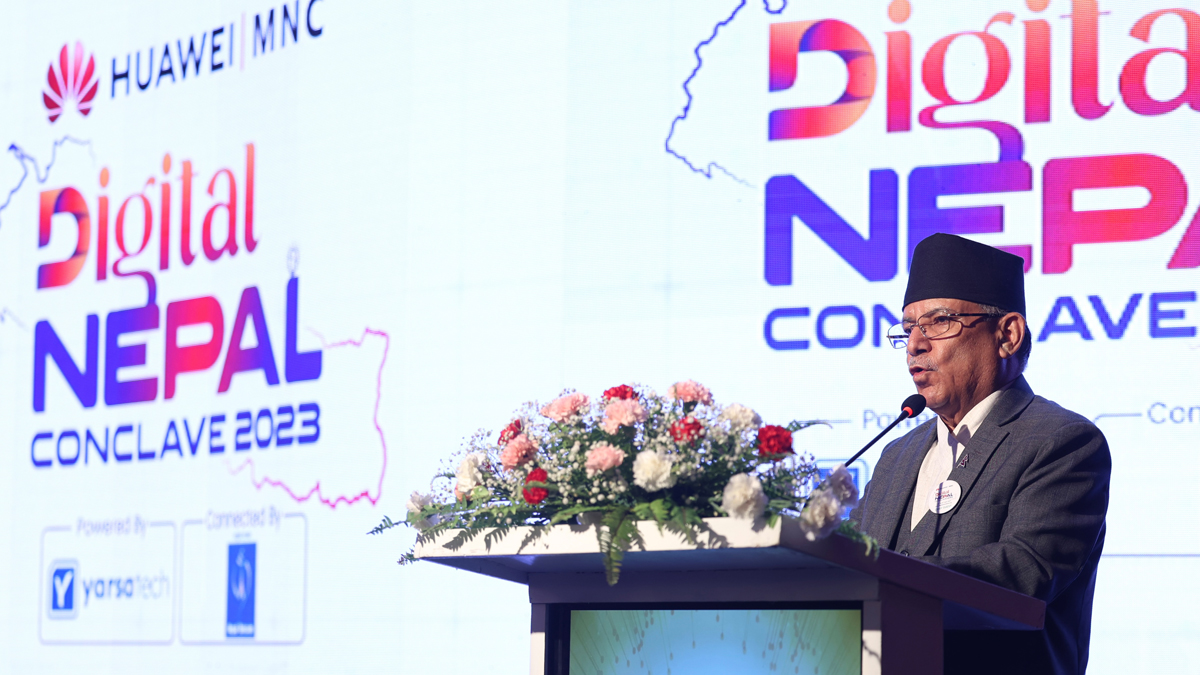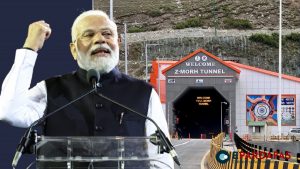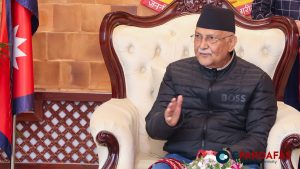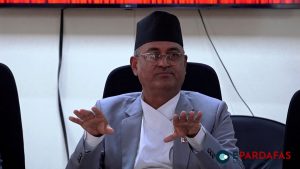
Government’s policy is to reduce ‘digital divide’: PM Prachanda
Prime Minister Pushpa Kamal Dahal ‘Prachanda’ has said the government has been making preparation to bring laws related to information technology into implementation after passing them from the parliament.
Addressing the ‘Huawei MNC Digital Nepal Conclave 2023’ organised by ICT Foundation Nepal and Huawei here today, Prime Minister Prachanda shared that the government’s attention has been focused to pass the acts and laws related to information technology, including the cyber security policy.
“The government is effortful to conclude the process of passing the required laws and policies including the bill related to information and communication technology, cyber security policy and startup policy, e-governance and e-commerce acts as soon as possible and bring them into implementation,” he mentioned.
PM Prachanda laid emphasis on the need of making public service delivery effective, easy and smooth by taking information and communication technology to the access of the people.
He further said he has directed the concerned bodies to pay special attention to the implementation of policies, rules and laws related to this as soon as possible.
There would be the government’s initiative in making the roadmap of Digital Nepal worthy making it better and timely by revising the Digital Nepal Framework, he shared.
Prime Minister Prachanda added that information and communication technology have high importance in the goals set by the government to achieve prosperity through social justice and good governance by building a self-reliant economy.
Stating that the government has stressed on development of infrastructures required for Digital Nepal, he mentioned necessary initiatives have been taken to uplift the lifestyle of the people of remote areas.
“Government’s aim is to reduce the digital divide and to stress on the digital economy”, he viewed, adding the country has not been able to make development as per the expectation due to Nepal’s geographical condition, lack of resources and capabilities and skilled human resources and some policy-level complexities.
PM Prachanda mentioned, “Though our expectation and thinking are as fast as ‘artificial intelligence’, resources, structures and working style are not according to it. It is necessary to make the country developed towards digital capability by paying special attention towards it.”
Producing capable human resources in the country in the ICT sector in the recent period was a strong point, he shared that this step has opened the door of possibility to end dependency on software.
The government in the budget has made arrangements of using technology invented at home though it is 20 per cent expensive, the Prime Minister said, adding he was aware of the brain drain of human resources of the ICT sector in the lack of jobs and opportunities in the country.
One per cent budget of the total budget for the coming fiscal year has been allocated for the invention startup and innovation sector, he added.
Stating that technology had been playing a major role in different periods of human development, PM Dahal asserted that the technologies that were developed at different stages of social changes had been playing a decisive role in transforming human society into an advanced one. “It is necessary to leverage information and communication technology (ICT) to deliver on development and to bring about changes in the country.”
According to him, the unprecedented development in the field of ICT had influenced all sides of society at present, the PM viewed that information technology had determined our behaviour, social ties, production system, knowledge and political intelligence and had and controlled them in some sense.
Therefore, the PM said that the right usage of ICT was important to attain the goals of development and prosperity, good governance and social justice and social transformation. Underscoring innovation, development and right usage of the ICT, the Head of the Government said, “Acknowledging this fact deeply, the government has emphasized the implementation of the concept of Digital Nepal.
To make the public service delivery prompt and swift and to provide hassle-free services to the public, he also shared that he took the lead to digitize essential services like the printing of passports, issuance of national identity cards and other documents as he assumed the leadership of the government.
He informed that Social Networking Procedure was revised for the public offices to ensure easy access of the public to public services and information.
“The government,” he added, “had taken necessary steps for permanent solutions to put an end to concerns related to cyber security and other risks that lurk in the government data centres and serve.”
He observed that until public service delivery was delivered digitally switching from ‘manually’ as in the present, good governance would barely be realized
“The incumbent government’s efforts are centred on the further developing relationship between government and public and ensure transparency in public service delivery as well as to ensure everyone’s access to public services.”
Stating that digital technology was important for achieving transparency, accountability and good governance, he spoke of the need to systematically optimize information technology to make the government’s role more effective in accordance with the public’s expectations in the sector such as education, health, employment and social awareness.
Participants in the two-day conference include ICT experts from South Korea, Japan, Singapore, India and Bangladesh among others. Prior to this, such event ‘Digital Dialogue” had earlier been organized in all other six provinces, and it was shared.
RSS













Comments